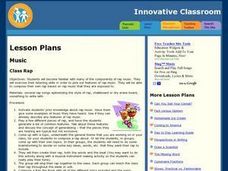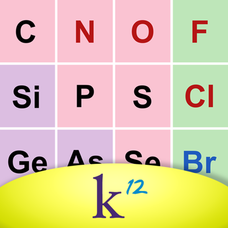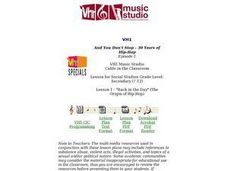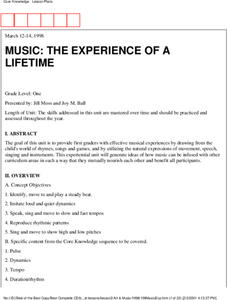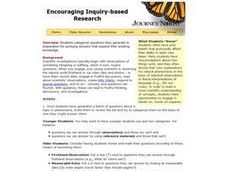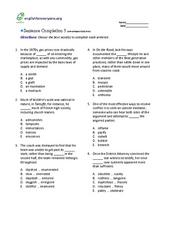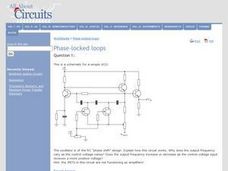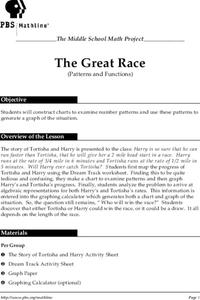Intel
Beat the Heat
Explore greenhouse effect and climate change through a 15-day unit. Scholars learn about these STEM concepts by researching, conducting surveys, experimenting, and collaborating with experts in the field. They frequently communicate...
Curated OER
Class Rap
Students explore rap music and its components. They listen to examples of rap music and discuss their common features. After selecting a topic, they compose a rap with both words and the beat and sing it to the class. As a class they...
Curated OER
TE Activity: The Beat Goes On
Students determine what the pulse is before examining how to measure the heart rate in different situations. They build a simple device that measures the heart rate, take heart rates, and record them on a worksheet. They discuss how...
Teach Engineering
Tell Me Doc—Will I Get Cancer?
Can you beat the odds of cancer? In the first installment of a seven-part series, future biomedical engineers consider how to detect and diagnose cancer. An article on biosensors provides useful information toward this goal.
K12 Inc.
K12 Periodic Table of the Elements
For anyone learning or teaching chemistry, nothing beats a free and interactive periodic table of the elements. Peruse the elements while learning about atomic number and mass, melting and boiling points, and many other properties of...
Curated OER
Back in the Day
Pupils identify the genre of music called Hip Hop, analyze its elements, and formulate a definition of the Hip Hop culture.
Museum of Science
Virtual Heart
No more beating the pavement to find a virtual model of the human heart. See one in continual real-time motion, and layer it to highlight electrical impulses, blood flow, and valve activity.
Curated OER
Studying The Catcher in the Rye
What's the difference between being a phony and being a conformist? At what point does conforming to alleviate loneliness lead to insincerity? These are the questions at the heart of this unit plan that uses The Catcher in the Rye...
Curated OER
Music: The Experience of a Lifetime
Students use rhymes, songs and games to help them study music. They discover how music can be used with movement, speech and singing.
Curated OER
Younger Generation
Students discuss the composer Aaron Copland and the lyricist Ira Gershwin and their significance in/contributions to American music of their time while singing the song "Younger Generation" in the choir setting. Emphasis is placed on...
Curated OER
Family History Through Art
Students discuss various ways families and communities pass down oral and visual art forms to younger generations. This multi-subject introductory lesson plan prepares students to create a project about their own families.
Curated OER
Tony Bennett: With Special Guests The Backstreet Boys - Lesson 2
Students clap four-beat rhythm patterns containing whole, half, dotted half, quarter, and eighth notes and rests in a given tempo. They clap the tempo as their teacher holds up flash cards.
Tinybop
The Human Body
Examine the systems of the human body with a bold, charming, and kid-friendly application. This noteworthy tool is certain to get kids interested what goes on inside of them! The eye feature uses the tablet camera to view images and show...
Curated OER
Encouraging Inquiry-Based Research
Students categorize questions they generate in preparation for pursuing answers that expand their existing knowledge. They create KWL charts and respond to journal questions to enable them to inquire to their fullest capacity.
Curated OER
Sentence Completion 5: Low-Advanced SAT Level
Sentence completion practice not only improves vocabulary, but critical thinking skills as well. Class members will benefit from exercises and the extended explanations that the answer key provides. Great SAT practice or class discussion...
Curated OER
The Science of Lance Armstrong
Live Strong! High schoolers will discuss some of the reasons behind Lance Armstrong's success in cycling and chart those reasons into four categories: Physiology, Psychology, Equipment, Training/Strategy. They will then choose one sport...
Curated OER
Teaching Word Meaning Synonyms, Antonyms, and Analogies
Strengthen and enhance your class's vocabulary with a guided lesson plan on word relationships. Focusing on synonyms and antonyms, the lesson plan demonstrates ways to compare and define different words, including word analogies and...
E Reading Worksheets
Tone Worksheet 4
A poet's word choice can be the difference between a poem that is merely sad, and a poem full of heartbreaking regret. Middle schoolers discern the tone in four different poems, noting the relevant textual evidence that supports...
Curated OER
Can You Build a Better Mousetrap?
Students use a variety of linked sites to research information about student inventions and contests that are available for them. They research an invention they would like to see become available. They communicate their results to their...
Curated OER
WATER QUALITY FOR FRESHWATER ORGANISMS
Learners use determination of dissolved oxygen and water temperature changes to determine the environmental impact from thermal pollution.
Curated OER
Weaving Traditions - Activity 1
Students practice the techniques of weaving and braiding in this introductory lesson on family traditions and visual art. The lesson includes a video and other resource links.
Curated OER
Shared and Guided Reading with Ice Cream Money
Here is a lesson which has young scholars locate an exclamation point and a comma from the text. They locate previously learned words on the page, and create a word map from the word "Money." Students write about and illustrate their...
Curated OER
Phase-locked Loops
For this physics worksheet, students examine how phase-locked loop circuits works and answer 8 short answer questions about it. They explain how FM radio communication works.
Curated OER
The Great Race
Students are presented with a story about two individuals running a race in which one is given a head start. Students must map the progress of the runners, create a chart examining patterns and graph the progress. In the end, students...



